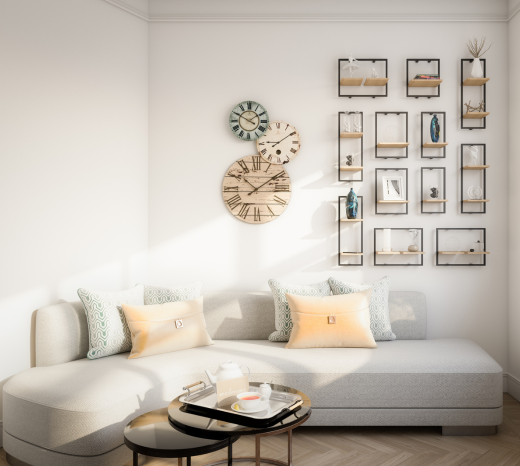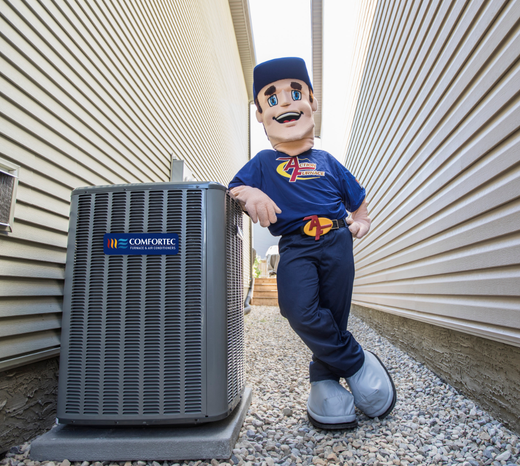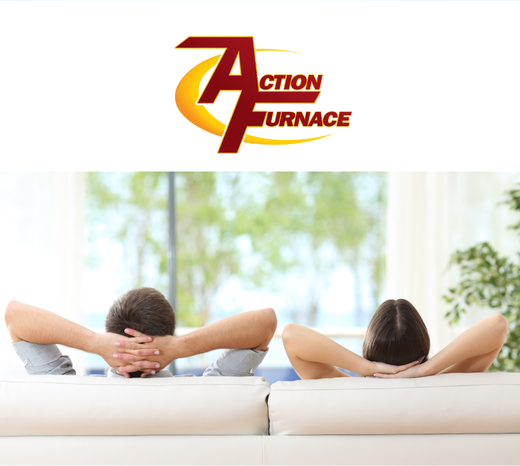Air Quality, Health & Safety, Home Comfort
Your furnace doesn’t just keep the air in your home warm enough during cold weather—it can also vastly improve your air quality. Adding a high-q...
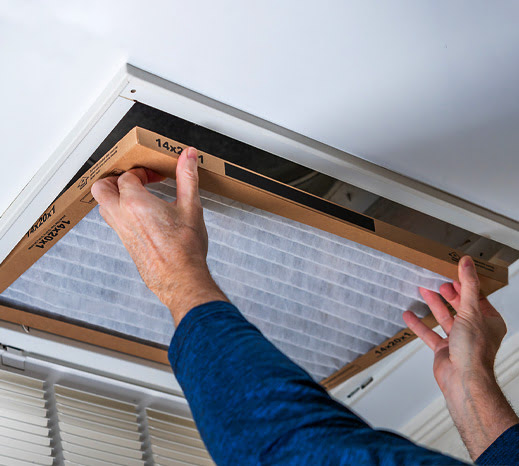
Your furnace doesn’t just keep the air in your home warm enough during cold weather—it can also vastly improve your air quality. Adding a high-quality air filtration system to your furnace prevents many small particles from making their way into the air you and your family breathe at home, lowering your risk for certain health hazards and giving your quality of life a boost.
But how do air filtration systems work, how easy are they to install, and how much do they cost? Don’t worry—the Action Furnace team has spent years installing these products, so we know all about them and we’re happy to share our knowledge with you. Learn all you need to know about adding an air filtration system to your home’s HVAC equipment below.
Do You Need an Upgraded Air Filter?
“Wait,” you might be thinking, ”don’t all central furnaces have filters?” You’re right; they do—but as it turns out, upgrading your HVAC equipment with a dedicated air filtration system can still be a good idea.
The standard air filters in most home furnaces can only catch particulate matter between 5-10 microns in size. This means that although they might be able to filter out larger particles like mold spores, they won’t capture everything. In fact, since 98% of particulate matter in a standard home’s air is less than 1 micron in size, standard air filters will only catch about 2% of what’s potentially floating around. Things they’ll likely miss include:
- Bacteria and viruses
- Smoke
- Fungi
- Pesticides and other chemicals
- Pet dander
- Most Dust
So the short answer is, no—the standard air filters in your central furnace, while useful to a point, may not be enough to ensure that the air you breathe at home is truly fresh and clear. Investing in an air filtration system is usually a good idea, since they are much more effective at removing these contaminants and others.
Benefits for Homeowners
Installing an air filtration system in your central furnace can provide your household with:
- Air that feels and smells fresher: fewer contaminants floating around indoors often helps eliminate feelings of stuffiness, and can even improve the odor inside your home.
- A healthier living environment: removing potentially harmful contaminants from the air also reduces your household’s risk of respiratory problems, allergies, and other health issues.
- Protection for your HVAC system: air filtration systems help to protect your HVAC system by preventing dirt, dust, and debris from building up on the components. This can help to extend the life of your HVAC system and reduce the need for costly repairs.
- Utility savings: the particles air filtration systems catch could otherwise enter your HVAC system and make it less efficient, so these upgrades can play a vital role in keeping your energy bills from climbing up over months or years of use.
- Peace of mind: knowing that the air in your home is cleaner can set you and your family at ease—especially if any of you struggle with allergies or respiratory issues like asthma.
Signs of Poor Home Air Quality
It’s an especially good idea to consider an air filtration system if you notice:
- Headaches, fatigue, or shortness of breath
- Sinus congestion, coughing, or sneezing
- Eye, nose, throat, or skin irritation
- Dizziness or nausea
- Worsening allergies or asthma symptoms
Different Types of Air Quality Solutions
There’s more than one way to improve your indoor air quality. Here are a few of the most popular methods, along with a brief explanation of how each one works.
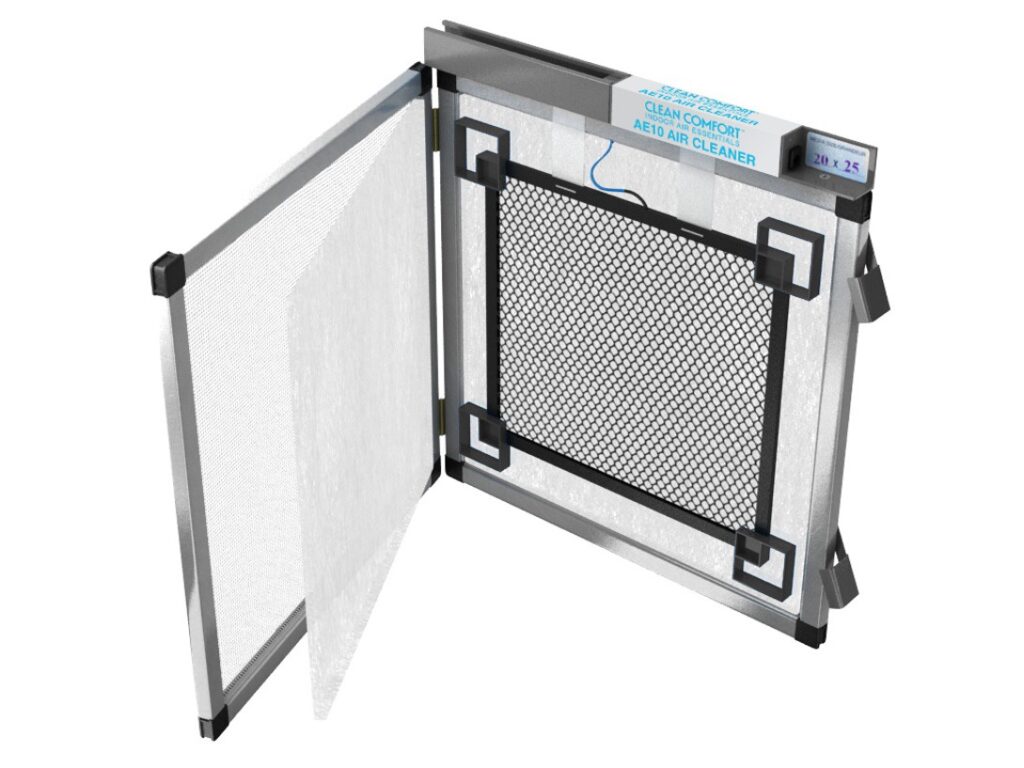
Electronic Air Cleaners
These upgraded furnace air filters are also called electrostatic filters. They work by creating an electrostatic charge between two metal plates. Particles that pass through the charged field become charged and are drawn towards the plate with the opposing charge. This traps them in the filter so they can’t enter the air you breathe.
The Ecomfort Electronic Air Cleaner (AE10) that we sell is 95% efficient at removing particles as small as 0.3 microns from your home’s air, and is only 1 inch thick—meaning it fits in the slot for your standard furnace filter and requires no extensive installation process.
Best for: homes with pets, smokers, large amounts of dust, and other particulate matter that standard furnace filters won’t trap effectively.
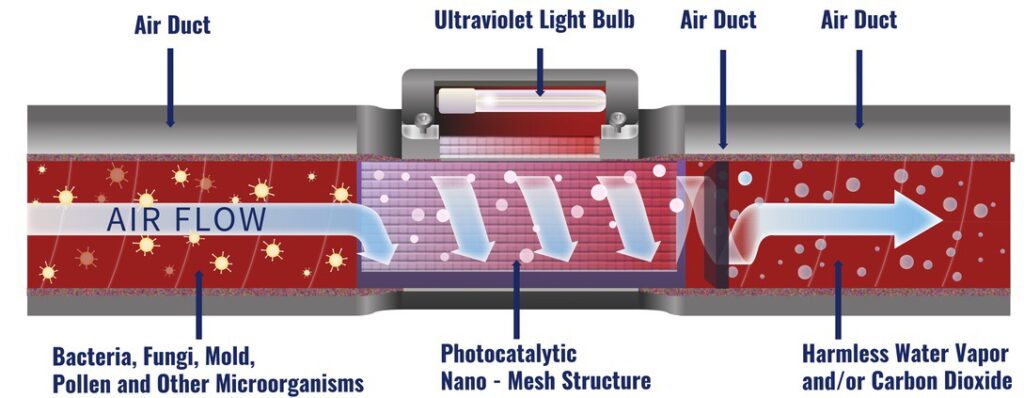
UVC Air Purification Systems
These systems are mounted to the outside of your furnace and use short-wave ultraviolet light to destroy the DNA of microorganisms as air passes into your ducts. They are particularly effective at rendering bacteria, viruses, and mold spores harmless.
The UVC air purifications we sell at Action Furnace can easily be installed in compact areas. They use either 12” or 16” bulbs that emit 150-180 microwatts of light.
Best for: humid homes or those with the potential for mold growth, homeowners who are concerned about the risks of viruses and bacteria-borne illnesses.
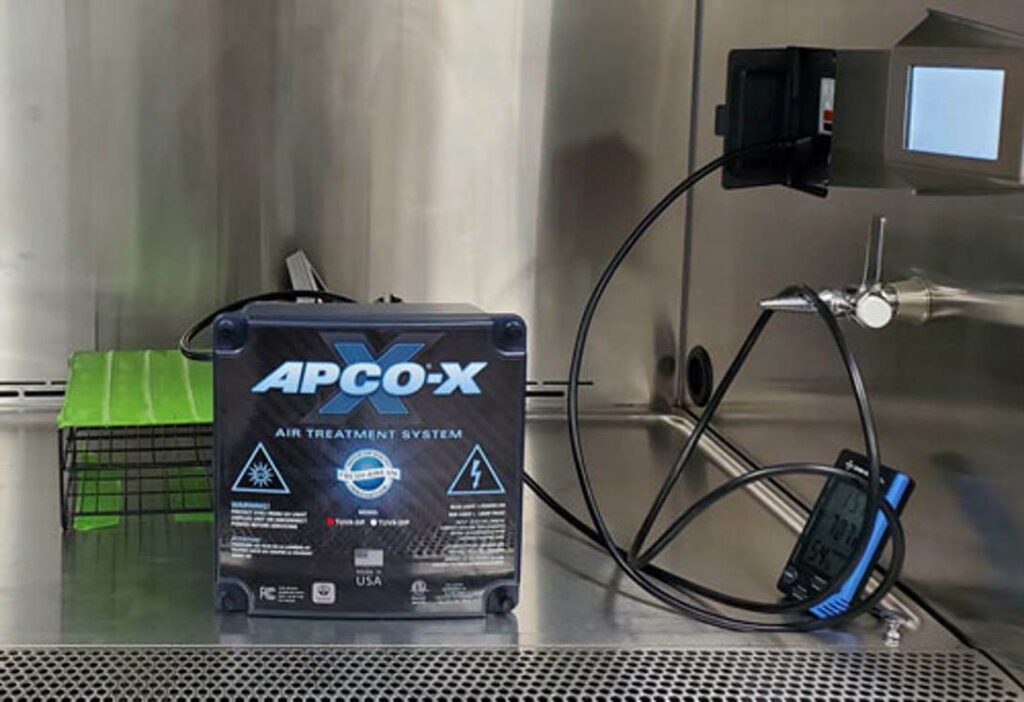
Whole Home Air Purifiers
These advanced purifiers use UVC light and a carbon filter. Since the light kills microorganisms and the filter traps particulate matter, these systems are often the most comprehensive way to improve your indoor air quality with a single upgrade.
Our APCO-X whole home purifiers also use UVC light to help prevent mold growth within your unit—which can be a more common problem in homes with high humidity.
Best for: homeowners who want a comprehensive indoor air quality solution and are willing to invest more upfront for one.
Should You Use an Electronic Air Cleaner or an Air Purifier?
The best way to noticeably improve your home’s air quality is to add both an electronic air cleaner and an air purification system to your furnace. You can bundle these products by investing in a whole home air purifier, which is often the best solution—but buying an electrostatic filter and a UVC purifier separately can also help you spread out the costs.
The order in which you should add these systems to your HVAC equipment depends on your priorities. If you’re more concerned with particulate matter (from pet dander, pollen, or smoke), we recommend upgrading to an electronic air cleaner first. On the other hand, if viruses, mold, and bacteria are of more concern to you, it’s probably best to purchase an air purifier first (you can—and should—always add whichever one you don’t buy first later).
Frequently Asked Questions about Alberta Air Filtration Systems
How Much Does an Air Filtration System Cost?
Here are the basic prices for each of the indoor air quality solutions we offer at Action Furnace:
- Ecomfort Electronic Air Cleaner (AE10): $570
- UVC Air Purification System: $649
- APCO-X Whole Home Air Purifier: $1645
Note that these are baseline prices only—labour costs may change depending on the installation location in your home and how easy it is to access, as well as other factors. For a specific quote on how much adding an air filtration system to your HVAC will cost you, contact us and speak with a professional.
How Hard Are Air Filtration Systems to Install?
This depends on the type of indoor air quality solution you purchase. Our electronic air cleaners can be installed without professional help, since they slide into the same slots as your standard furnace filters.
UVC purification systems are generally not time-consuming to install since they mount onto the outside of your furnace, and most installations for our whole-home purifiers can be completed in a single business day—we’ll give you a timeline before we start work so you know what to expect.
What Contaminants Can an Air Filtration System Remove?
Electrostatic filters are excellent at removing the following contaminants from your home’s air:
- Smoke
- Dust
- Pet Dander
- Pesticides and chemical residue
UVC systems destroy the microorganisms in:
- Mold Spores
- Fungi
- Bacteria
- Viruses
Whole home purifiers will effectively remove all of the above from the air in your home.
What Maintenance Will My Air Filtration System Need?
If you have an electrostatic air filter, you’ll simply swap the filter pad (not the plates) every 4 months or so. New filter pads are relatively inexpensive, making this a cost-effective way to remove particles from your air once you’ve made the initial purchase.
UVC systems usually need to have their bulbs replaced every 9-12 months, and may also need dusting with a soft cloth if you do not combine them with a high-quality air filter. Whole home purification systems like the APCO-X will need to have the bulbs changed and the filter pads replaced at intervals similar to those listed above.
Can Air Filtration Systems Make My Home’s Air Smell Better?
Yes—air filtration systems often improve the odor in homes where the particulate matter in the air has an unpleasant smell. This is most noticeable in homes with significant amounts of smoke, dust, or pet dander. You’ll most likely notice less mustiness and a “fresher” quality to the air you breathe.
Upgrading Your Air Filter Helps You Breathe Easier in Your Home
The standard filter in your furnace is important, but it’s far from a perfect solution if you want the air in your home to be as healthy as possible. Upgrading to an electrostatic air filter is an excellent way to remove particles from the air that your regular furnace filter can’t catch, and adding UVC air purification (or getting a single system that uses both) can also remove the health risks associated with microorganisms.
The best way to find out what air filtration or purification system will work best in your home is to get an opinion from an expert, so don’t be shy! Talk to our experienced home comfort professionals in Calgary, Edmonton, or Red Deer.

